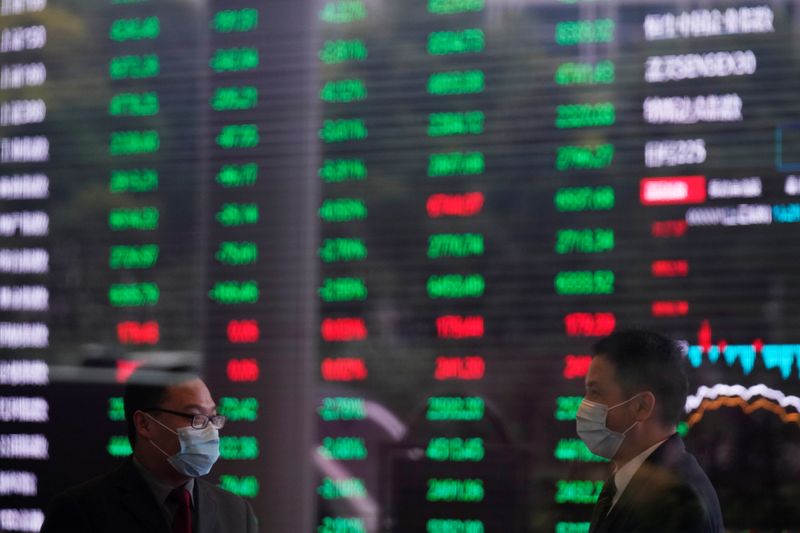SHANGHAI (Reuters) - A collapse in China's blue-chip share prices has raised the ire of investors, angry at the way asset managers have crowded into a handful of large stocks and increased market volatility.
Liquor giant Kweichow Moutai, Asia's fourth-biggest stock and a perennial market darling, has become the poster child of the recent selloff as its steep losses hurt mutual funds heavily invested in its shares.
Its shares have shed a quarter of their value since a Feb. 18 peak as concerns over Beijing's monetary tightening triggered a sharp sell-off in larger stocks. More than 900 stock funds lost at least 20% in net assets over the past month, according to fund distributor eastmoney.com.
GRAPHIC: China's market darlings lost momentum - https://fingfx.thomsonreuters.com/gfx/buzz/qzjpqlwejvx/China's%20market%20darlings%20lost%20momentum.jpg
Kevin Zhang, a retail investor, lost one-fifth of his investment in E Fund Blue Chip Selected Mixed Fund in a matter of weeks.
Four distillers - Moutai, Wuliangye, Luzhou Lao Jiao and Jiangsu Yanghe Brewery - account for roughly 40% of the $10 billion fund.
Moutai was among the top 10 portfolio holdings in 576 stock funds at the end of 2020 - over one third of 1,510 tracked by Everbright Securities. Smaller rival Wuliangye is the second-most popular, with 473 funds placing big bets.
After raising record amounts of cash in 2020, Chinese money managers rushed into a cluster of high-flying consumer and healthcare stocks, pushing share prices even higher.
The sharp fall in markets since mid-February has bruised such funds and laid bare the controversial practice of "huddling", wherein mutual funds take on outsized stock and sector exposures as they seek to outperform benchmark indexes and lure more investors.
The China Huddling 50 Index, compiled by Sinolink Securities and tracking 50 fund manager favorites, has outperformed the Shanghai Composite Index by 10 times since 2017.
China's mutual fund industry jumped by a third last year to exceed $3 trillion as Beijing encouraged institutional investment.
But as markets have turned, some investors are losing confidence in mutual funds' ability to do what regulators desire: make rational, long-term decisions that generate value.
"The rapid growth of China's fund industry has not turned the market less volatile. Rather, it has become a source of market volatility," writes Yin Zhongli, researcher at the Chinese Academy of Social Sciences.
Ye Qiu, a retail investor on the platform Xueqiu.com, even described institutional investors' huddling as a Ponzi scheme. "Retails investors are burnt when the bubble bursts," Ye posted.
STUFFED
Fund "huddling" is not unique to China.
U.S. investors' addiction to "FAANG" tech giants - namely Facebook (NASDAQ:FB), Amazon (NASDAQ:AMZN), Apple (NASDAQ:AAPL), Netflix (NASDAQ:NFLX) and Alphabet (NASDAQ:GOOGL) - pose similar problems.
What's unusual, however, is the extreme valuations China's huddling has caused, said Yan Xiang, strategist at Guosen Securities.
The median valuation of the top 100 holdings by Chinese stock mutual funds - accounting for 74% of their concentrated portfolio assets – hit a record high of 80-times earnings in January.
That compares with an average price/earnings ratio of 20 for China's more than 4,200 stocks, and 51 for FAANG stocks.
Moutai's current valuation "is irrational, and unfathomable," said Dong Baozhen, a Beijing-based hedge fund manager who bought the stock at around 150 yuan ($23.08) in 2013, and sold it in early 2018 for 700 yuan.
Moutai shares have tripled since 2018, to as much as 2,627.9 yuan. Valued at $400 billion, it remains Asia's fourth-biggest stock by market cap even after the recent savage sell-off and trades at 57 times historic earnings.
Huang Yan, vice president of Shanghai See Truth Investment Management reckons huddling has "created a big bubble," and distorted the market by allocating resources to companies like Moutai that don't need the cash.
However, not everyone sees the practice as problematic.
"It's the result of the recent massive fund raising activities," said Peter Alexander, founder of fund consultancy Z-Ben Advisors. "Simply a 'high class problem' of having to get large swathes of money to work as quickly as possible."
